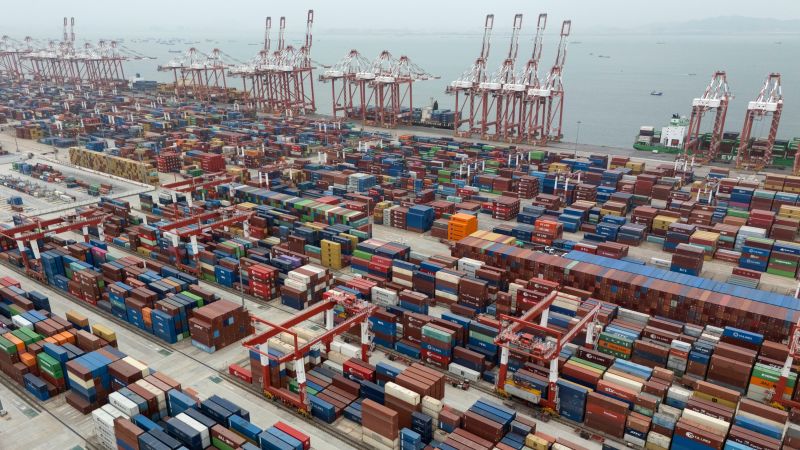New York
CNN
—
Shoppers got a little relief this week from a giant tariff on previously cheap, duty-free goods from China. But the tariffs that do remain are still poised to derail the shopping habits of millions of Americans who shop at ultra-low-priced e-commerce sites like Shein and Temu.
The Trump administration has cut its tariff on “de minimis” packages, or shipments of goods worth $800 or less, coming in from China from 120% to 54% and slashed the rate from 145% to 30% for packages from commercial carriers. A $100 flat-fee option also won’t surge to $200 per postal item come June 1, as was previously planned, according to an executive order issued Monday and which goes into effect after midnight on Wednesday.
The change is emblematic of the state of the US-China trade war. The relationship is improving, but it still has further to go before it’s back to pre-January levels. On Wednesday, China rolled back its overall tariffs on US goods to 10% for 90 days, while US levies on the vast majority of Chinese products have gone down to 30% for that period. The US tariffs come on top of levies that were already in place before US President Donald Trump began his second term.
Monday’s executive order eases the 120% tariff on de minimis postal packages down. The new 54% rate only applies to shipments handled by postal services such as USPS. Deliveries from UPS, FedEx and other express courier companies will instead face the baseline tariff on Chinese goods, which the US lowered to 30%, still crippling for many businesses and consumers.
At the end of the day, the brunt of the tariffs will fall on US consumers, especially lower-income ones who rely on relatively inexpensive products from China. Now, Americans can expect longer wait times and higher prices, trade experts told CNN.
“It’s a better scenario than the alternative, but ultimately still this is a tremendous disruption for basic household items, like clothing, etc, that are shipped using the de minimus exemption,” Clark Packard, a trade policy research fellow at the Cato Institute, a libertarian think tank, told CNN.
The de minimis exemption had allowed Chinese e-commerce giants like Shein and Temu to flood the US market with cheap items, which millions of Americans relied on.
But after President Donald Trump first enacted punishing tariffs on Chinese imports, chaos ensued: USPS briefly stopped delivering parcels from China and delivery times grew. After the exemption expired two weeks ago, customers told CNN that they were struggling to continue buying from Shein and Temu after the platforms raised their prices.
Hours after the de minimis exemption expired in early May, Temu announced it was overhauling its shipping model, sending out all American sales via US-based sellers, adding that its “pricing for US consumers remains unchanged.”
CNN has reached out to Temu on updates to its shipping policies since the new tariff was announced.
The tariff remains higher on cheap imports compared to the overall tariff on Chinese goods because the Trump administration said it wants to crack down on illicit substances like fentanyl that allegedly get smuggled in through these packages. Packard also noted the growing skepticism over the de minimis exemption, which critics argue hurts US businesses and expose Americans to fake or “dangerous” goods.
The rollercoaster has sent shippers and consumers alike into confusion. Even with the newly cut rate, the impact on these gargantuan e-commerce businesses remain unclear.
Trade experts say Chinese e-commerce giants will likely stockpile products in the US during this de-escalation period, especially as companies begin preparing for the busy holiday season.
Temu and Shein have already started to build up their US warehouse portfolios to lower shipping times. Shein began stockpiling goods and bulk-shipping to US warehouses as early as last year, and Bloomberg reported in February that Temu began overhauling its Chinese supply chain, asking supplier factories to ship items in bulk to US warehouses.
Some of Temu’s American buyers complained this month that items were already out of stock or that many items weren’t available anymore.
Lower-income households will suffer the most from higher prices on Chinese e-commerce sites. About 48% of de minimis packages shipped to the poorest zip codes in the United States, while 22% were delivered to the richest ones, according to February research from UCLA and Yale economists.
“It’s going to hurt people that are struggling a little more than average Americans,” Packard said.

